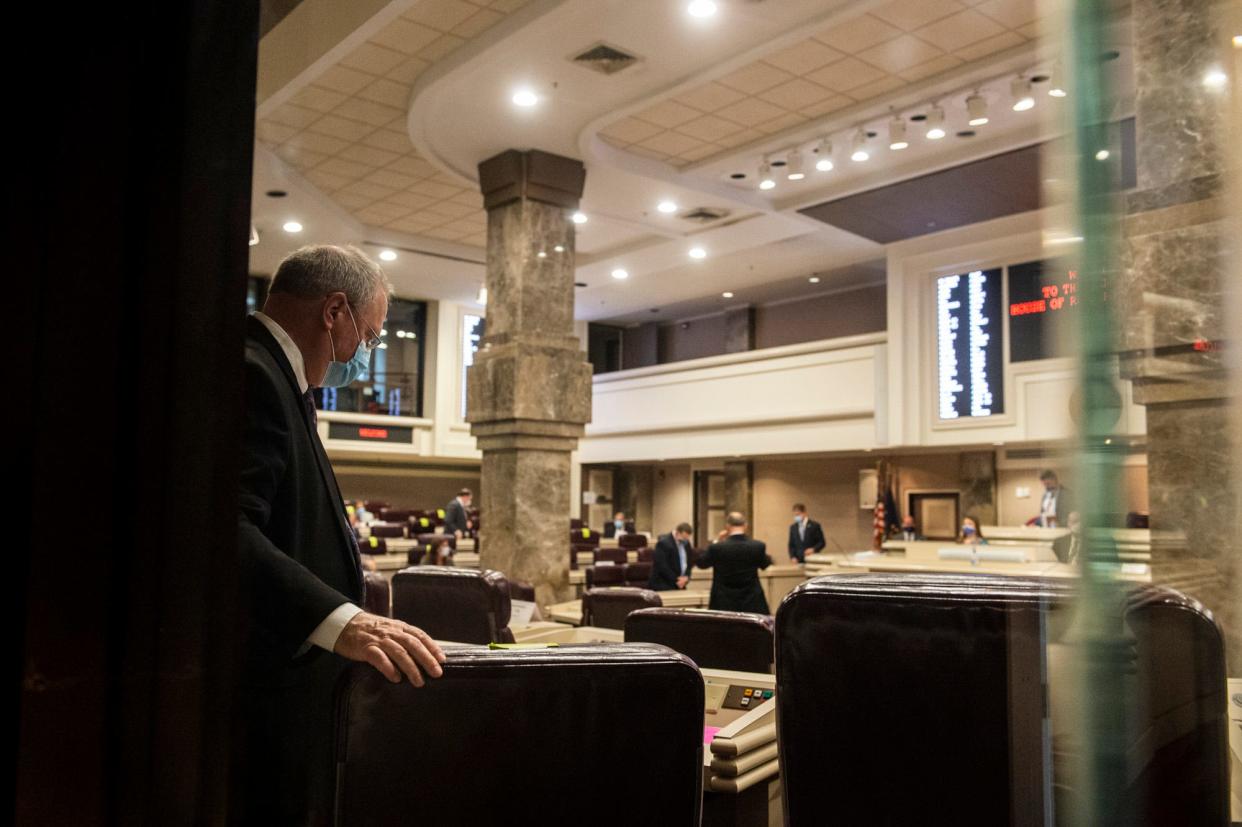Alabama House committee approves changes to definition of riot

- Oops!Something went wrong.Please try again later.
An Alabama House committee Tuesday approved a bill that would change the definition of riot; create new crimes of assaulting first responders and blocking highways and interstates, and cut off state funding to governments that abolish their police departments.
The legislation passed 10-4 on party lines, with Republicans voting for it and Democrats voting against it after voicing concerns about its effect on peaceful protest. The legislation goes to the full House.
HB 2, sponsored by Rep. Allen Treadaway, R-Birmingham, would make a new crime of assault on a first responder, punishable by up to 20 years in prison, and would change the definition of rioting. The state code currently defines rioting as when a person, with five other people, "wrongfully engages in tumultuous and violent conduct and thereby intentionally or recklessly causes or creates a grave risk of public terror or alarm."
Transgender youth: Alabama Senate committee approves bill criminalizing treatments for transgender youth
Carry bill: Permitless carry bill sparks emotional debate in Alabama House committee
Treadaway's bill would change the definition to "the assemblage of five or more persons engaging in conduct which creates an immediate danger of damage to property or injury to persons, and would make it a crime when a person "intentionally participates in a riot" after "receiving an order to disperse by a law enforcement officer or in violation of a curfew."
The bill imposes a mandatory 30-day minimum incarceration for anyone convicted of riot in inciting people to riot. Treadaway, a retired assistant police chief in Birmingham, said that attacks on police officers and what he saw "folks coming in a hijacking peaceful protest."
"We're putting lives of the officers and the protestors in danger," he said.
The legislation has drawn criticism from the ACLU, which said the penalties in the law were already covered by other laws and that a similar law passed in Florida had been ruled unconstitutional.
"HB 2 violates the First and Fourteenth Amendments to the United States Constitution by imposing harsh criminal penalties on people who peacefully participate in legal protests, allowing for warrantless arrests, and imposing 24 hour holding periods before those arrested are eligible to post bail," the ACLU said in a statement.
Black members of the committee, citing discriminatory practices in law enforcement, were skeptical about the application of the law. Rep. Merika Coleman, D-Pleasant Grove, who is Black, asked Treadaway who would determine what constituted a riot, saying some people could make wrongful assumptions about gatherings of Black men.
"They make an assumption about who they are and they make an assumptions about what they're going to do," Coleman said. "How do we make sure that bad actors don't use this provision in the law disproportionately against people of color?"
Treadaway said "you have to put faith in the process."
Rep. Chris England, D-Tuscaloosa, asked Treadaway what he considered the difference between "a riot" and "legitimate political discourse."
"It appears to me the definition of riot and legitimate political discourse is who’s participating in it," he said. "Some people carry the benefit of doubt. Some people carry presumption. People who look like me carry presumption. People who don’t look like me carry the benefit of the doubt."
England also noted that the bill as filed did not initially require intent for a person to be charge with rioting. The committee amended the legislation to change the definition of riot from "resulting in conduct which creates an immediate danger of damage to property or injury to persons" to "engaging in conduct."
Rep. Prince Chestnut, D-Selma, also criticized the mandatory minimums in the bill, saying they would reduce the incentive for defendants to plead and clog up the court system.
"As a defense lawyer, if I know that my client will do 30 days without any type of good time, any type of consideration whatsoever, I'm trying the case," he said. "I'm calling as many witnesses as I can call. It's literally going to clog up the court system, because the prosecutors aren't given the leeway to negotiate and make sure they give the time to the worst of the worst."
Treadaway filed his bill last year, but it did not end up passing.
Contact Montgomery Advertiser reporter Brian Lyman at 334-240-0185 or blyman@gannett.com.
This article originally appeared on Montgomery Advertiser: Alabama House committee approves bill to change definition of riot

